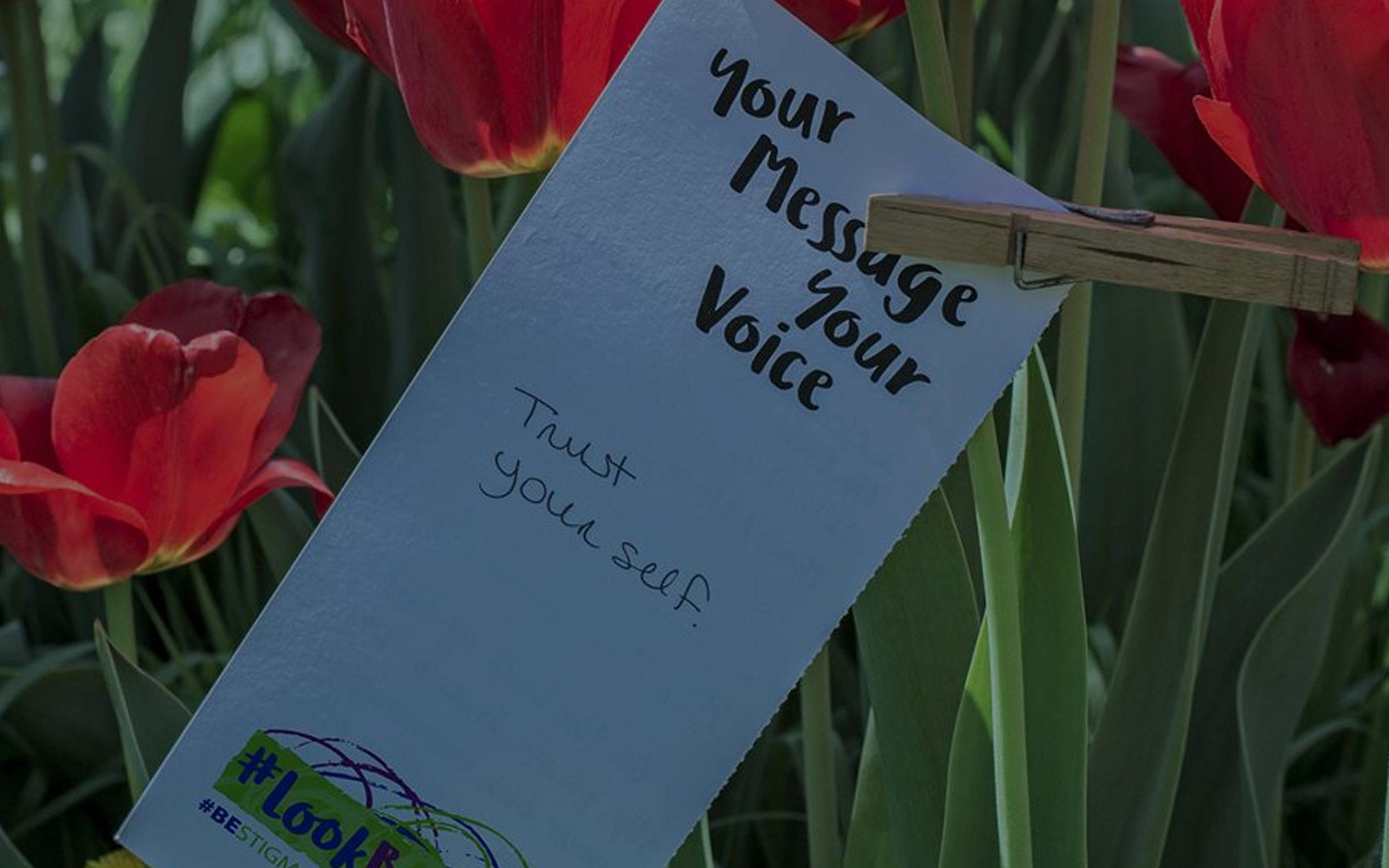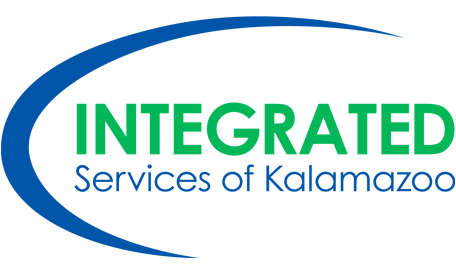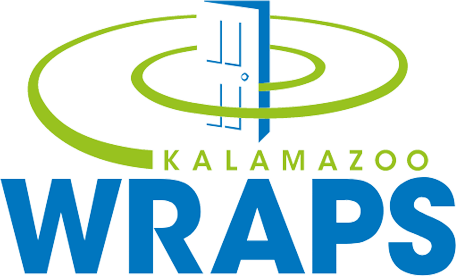Resources
Learn more about #LookingBeyond stigma
Resources
BECOME A STIGMA FREE ZONE
Your agency, nonprofit, business, service group, school or faith community can pledge as a group and be recognized as a Stigma-Free Zone! (At left is Rhino Media of Kalamazoo.)
Let the world know you’re welcoming, inclusive and respectful of all people. Help spread the message in your community to #BeStigmaFree. Learn more HERE.
TAKE MENTAL HEALTH FIRST AID
Learn risk factors and warning signs for mental health and addiction concerns, strategies to help someone in crisis and where to turn for help.
Mental Health First Aid (MHFA) is an 8-hour evidence-based program designed to give members of the public key skills necessary to appropriately respond to signs of mental illness. Watch our video about the benefits of taking MHFA, in the words of local leaders. Visit the official MHFA website HERE.
KCMHSAS is proud to offer MHFA training to community members at no charge, thanks to funding from SAMHSA (the Substance Abuse and Mental Health Services Administration).
ABOUT OUR FREE TRAINING
GENERAL INFO: We offer several one-day classes per year that are open to the public. Each MHFA class runs from approximately 8 a.m. to 5 p.m. All materials are provided. Lunch is on your own, unless specified otherwise. View classes and registration on our Eventbrite page.
ON-SITE CLASSES: We can also come to YOUR organization to provide group training! Just fill out this Training Request Form or contact Julie Helmer at 269-364-6950 or jhelmer@kazoocmh.org.
ACCOMMODATIONS: We want everyone to be able to fully participate in training. We can arrange for wheelchair access, visual or hearing assistance, etc. To ensure we can meet your needs, please contact Julie Helmer at least two weeks before the training.
TYPES OF CLASSES
ADULT MHFA: For anyone age 18 & older who wants to learn how to help a person experiencing a mental health related crisis or problem. LEARN MORE
YOUTH MHFA: Designed for adults who regularly interact with young people. Learn how to help an adolescent (age 12-18) experiencing a mental health or addictions challenge. LEARN MORE
MHFA for VETERANS, MILITARY MEMBERS and THEIR FAMILIES: Focuses on military culture and risk factors faced by service members. Learn how to break down stigma, reach out to those who are reluctant to seek help and access community resources. Designed for military members, veterans, their families, friends and colleagues. LEARN MORE
Students at Kalamazoo College
MHFA for HIGHER EDUCATION: Focuses on the unique experiences and needs of college students, campus culture and risk factors faced by those in higher education. A great option for students (must be at least 18), faculty, administrators, resident advisors, coaches and athletic staff, campus law enforcement, academic advisors, counselors, campus clergy, librarians, etc. LEARN MORE
some of the ORGANIZATIONS WE'VE TRAINED
Our trainers at the Cheff Therapeuitc Riding Center
Boys & Girls Clubs of Greater Kalamazoo
Bronson Methodist Hospital
Cheff Therapeutic Riding Center
Guardian Finance and Advocacy Services
Gull Lake Community Schools
Kalamazoo College
Kalamazoo County Department of Health & Human Services
Kalamazoo County Juvenile Home
Kalamazoo Department of Public Safety
Kalamazoo Public Library
Kalamazoo Valley Community College
Paramount Charter Academy
Recovery Institute of Southwest Michigan
Western Michigan University
Vicksburg Schools
Veteran/Military Organizations
And more!
View classes and registration on our Eventbrite page.
Helpful Information
To increase awareness and encourage action, we’ve gathered some stigma-related resources for specific communities. (If you come across a great resource you think we should list, let us know at hello@LookBeyondStigma.org.)
Resources For Everyone
#LookBeyond VIDEO: This six-minute video explains the #BeStigmaFree campaign through the voices of Mia, Anna, Latrieva, Michael, Isaiah and Amy. Whether due to mental illness, substance use or disability, these individuals and their loved ones have experienced “othering,” and they explain what it feels like in honest language. Hear their stories and learn why they believe it’s time to #LookBeyond stigma in Kalamazoo County.
Recovery Institute’s PoWeR Group
PoWeR (Peers in Wellness and Recovery) Group is a speakers’ bureau of individuals in recovery who speak at various educational, civic and social service organizations, telling their recovery stories in order to raise recovery consciousness, reduce stigma and eliminate discrimination. To arrange a PoWeR Group presentation at your school or organization, contact:
Sharee' Niblack
Recovery Institute of Southwest Michigan
1020 South Westnedge
Kalamazoo, MI 49008
269.343.6725
sniblack@recoverymi.org
Support for Family Members & Caregivers of People Living with Mental Illness: From NAMI (National Alliance on Mental Illness)
Words Matter: How Language Choice Can Reduce Stigma (handout)
The language we use to discuss substance use disorders either formally, as part of prevention messaging, or informally, in conversations with colleagues and stakeholders, can either increase or decrease SUD stigma. In the context of the growing opioid crisis, the language we use becomes particularly important as we find ourselves working in partnership with people who actively misuse substances and confront directly the myriad societal stigmas associated with having an SUD.Attitudinal Barriers (handout)
The biggest challenge for those who have disabilities is typically not the disability itself, but rather the attitudinal barriers imposed by others. “Attitudinal barriers” are ways of thinking or feeling resulting in behavior that limit the potential of people with disabilities to be independent individuals.
Help kids without disabilities become allies of people with disabilities (Tip Sheet for Parents/Guardians)
Resources for Schools:
Educators, Administrators & Staff
Free Youth Mental Health First Aid Training
Youth Mental Health First Aid is designed to teach parents, family members, caregivers, teachers, school staff, peers, neighbors, health and human services workers and other caring citizens how to help an adolescent (age 12-18) who is experiencing a mental health or addictions challenge or crisis. Youth Mental Health First Aid is primarily designed for adults who regularly interact with young people. ISK offers the one-day course for free to individuals and groups. Check our website page for more information.
Ending the Silence
A free 50-minute mental health presentation for middle and high school aged youth, presented by a trained group including a young adult living with a mental health challenge and an adult living in recovery with mental illness or a family member of an individual living with mental illness. Ending the Silence helps youth learn early warning signs of mental illness and offers resources and tools to help themselves, friends or family members who may be in need of support. Contact with an individual living with mental illness dispels myths, instills a message of hope and recovery and encourages students to reduce the stigma associated with mental illness. NAMI Kalamazoo’s program was featured in a WWMT news segment in February 2018.
be nice. Education Programs for Elementary, Middle and High Schools
be nice. is a mental health program from the Mental Health Foundation of West Michigan that directly educates students, staff and parents with the tools to recognize a mental health illness. The Action Plan helps others notice, invite, challenge and empower themselves and their peers.
Bring Change to Mind: High School Program
Tools for creating student-led clubs dedicated to mental health conversations. Bring Change to Mind’s High School Program gives teens a platform to share their voices and raise awareness around mental health. Its goal is to empower students to educate one another, and their communities, and to create a culture of peer support within their schools.
Mental Health Lesson Plans for Junior and Senior High Students
Developed by the Alberta Teachers Association and the Canadian Mental Health Association, these lesson plans were created to bring the discussion of mental health and mental illness into the classroom. “As educators, we have the ability to work towards the elimination of stigma and discrimination by teaching the new generation that people with a mental illness are not to be feared, judged, avoided or discriminated against.”
Tools for Schools from the Suicide Prevention Resource Center
Resources for promoting emotional well-being and connectedness among all students, identifying students who may be at risk for suicide and being prepared to respond when a suicide death occurs.
#MyYoungerSelf Educators Toolkit
These tools for educators to encourage classroom dialogue around child and adolescent mental health and learning disorders are appropriate for students in middle school and above. About #MyYoungerSelf: As part of their mission to decrease stigma and fear surrounding mental health and learning disorders, the Child Mind Institute asked more than 30 prominent people — from actors to athletes to business leaders — to make videos sharing their personal experiences about growing up with these challenges. Participants in the campaign talked candidly about their struggles and offered support and empathy to young people coping with mental health and learning disorders today. Personal stories from Emma Stone, Michael Phelps, Jesse Eisenberg and many more offer positive messages about the importance of getting help.
for Medical Professionals & Service Providers
The Power of Perceptions and Understanding: Changing How We Deliver Treatment and Recovery Services
This four-part webcast series from the Substance Abuse and Mental Health Services Administration (SAMHSA) educates healthcare professionals about the importance of using approaches that are free of discriminatory attitudes and behaviors in treating individuals with substance use disorders (SUDs) and related conditions, as well as patients living their lives in recovery.
After an Attempt: A Guide for Medical Providers in the Emergency Department Taking Care of Suicide Attempt Survivors (PDF) Developed by the National Alliance on Mental Illness (nami.org) in partnership with the Suicide Prevention Resource Center (sprc.org) under a grant from SAMHSA.
“One of the most important things you can do for a patient or family member after having been in the ED is to offer hope. Patients and families will look to you to determine the prognosis and for some assurance that this will not happen again. While you cannot guarantee there will not be a recurrence, you can assure them that recovery is likely if the individual and, if appropriate, a family member work closely with a therapist to ensure that the safety and treatment plans are meaningful and effective.”
Treatment 101: Finding Effective Care
An overview from SAMHSA of the different types of evidence-based treatments and resources available today for persons recovering from mental and substance use disorders. The panelists discuss the importance of integrated and personalized treatment, including programs targeting families, faith-based program solutions, trauma-informed care, medication-assisted treatment (MAT), Cognitive Behavioral Therapy (CBT), peer-led support and others. Experts highlight the need for evidence-based research that measures the improvements and positive outcomes achieved when implementing best practices. Panelists also address the barriers to quality care, treatment of co-occurring disorders and the role behavioral health counselors can play in primary care settings. Finally, the show highlights recovery as an ongoing process, one that is best served by perseverance, open-mindedness and resiliency.
How childhood trauma affects health across a lifetime (TED Talk)
An impassioned plea from Nadine Burke Harris for pediatric medicine to confront the prevention and treatment of trauma, head-on. (TEDMED 2014) “Children are especially sensitive to … repeated stress activation, because their brains and bodies are just developing. High doses of adversity not only affect brain structure and function, they affect the developing immune system, developing hormonal systems, and even the way our DNA is read and transcribed.”
SUICIDE PREVENTION RESOURCES
Suicide Prevention Resource Coalition
Society for the Prevention of Teen Suicide
Toolkit for After a Suicide at School
Suicide Prevention Toolkit for Schools
Suicide Awareness Voices of Education: Useful information for education programs, as well as information for the community about suicide and finding help.








